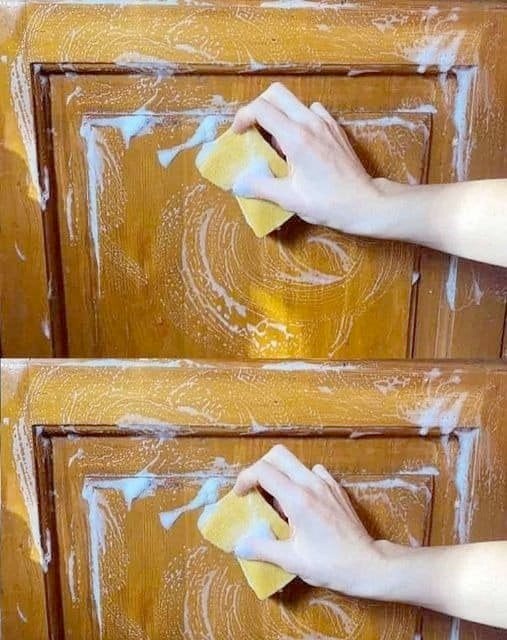Read more on next page
Develop an Effective Cleaning Agent: Mix white vinegar and warm water in a small dish or bucket in equal proportions. To make the oil easier to remove, add a few drops of dish soap. A few drops of lemon essential oil, if preferred, may also be used for a nice aroma.
Use the Answer: To clean, soak a sponge or microfiber cloth in the solution and squeeze away the extra water. Pay special attention to the places where the grease has accumulated on your kitchen cabinets and gently wash them clean.
Add Baking Soda. Applying a little baking soda straight to the site can help remove difficult stains and greasy buildup. Without harming the surface of the cabinets, baking soda’s inherent abrasiveness aids in lifting oil and filth.
Rinse and Scrub: Apply baking soda to greasy areas using a moist sponge or towel and gently scrub in circular movements. Keep scrubbing until you see the grease starting to come off. The best way to remove any loosened oil and keep it from spreading is to rinse the cloth or sponge often with clean water.
After you’ve loosened the oil, wipe down the cabinets with a clean, moist towel to remove any remaining cleaning solution or baking soda.
Last but not least, make sure the cabinets are totally dry by wiping them off with a dry microfiber cloth. Doing so helps in protecting the cabinet surface from water stains and streaks.
As required, repeat: It may be necessary to clean the cabinets many times in order to remove really grimy stains or sticky grease accumulation.
If you want a clean, attractive kitchen, all you have to do is follow this easy-to-follow approach to remove oil and dirt from your cabinets. Your kitchen may maintain its pristine condition for many years with the help of a few all-natural products and a little elbow grease.
